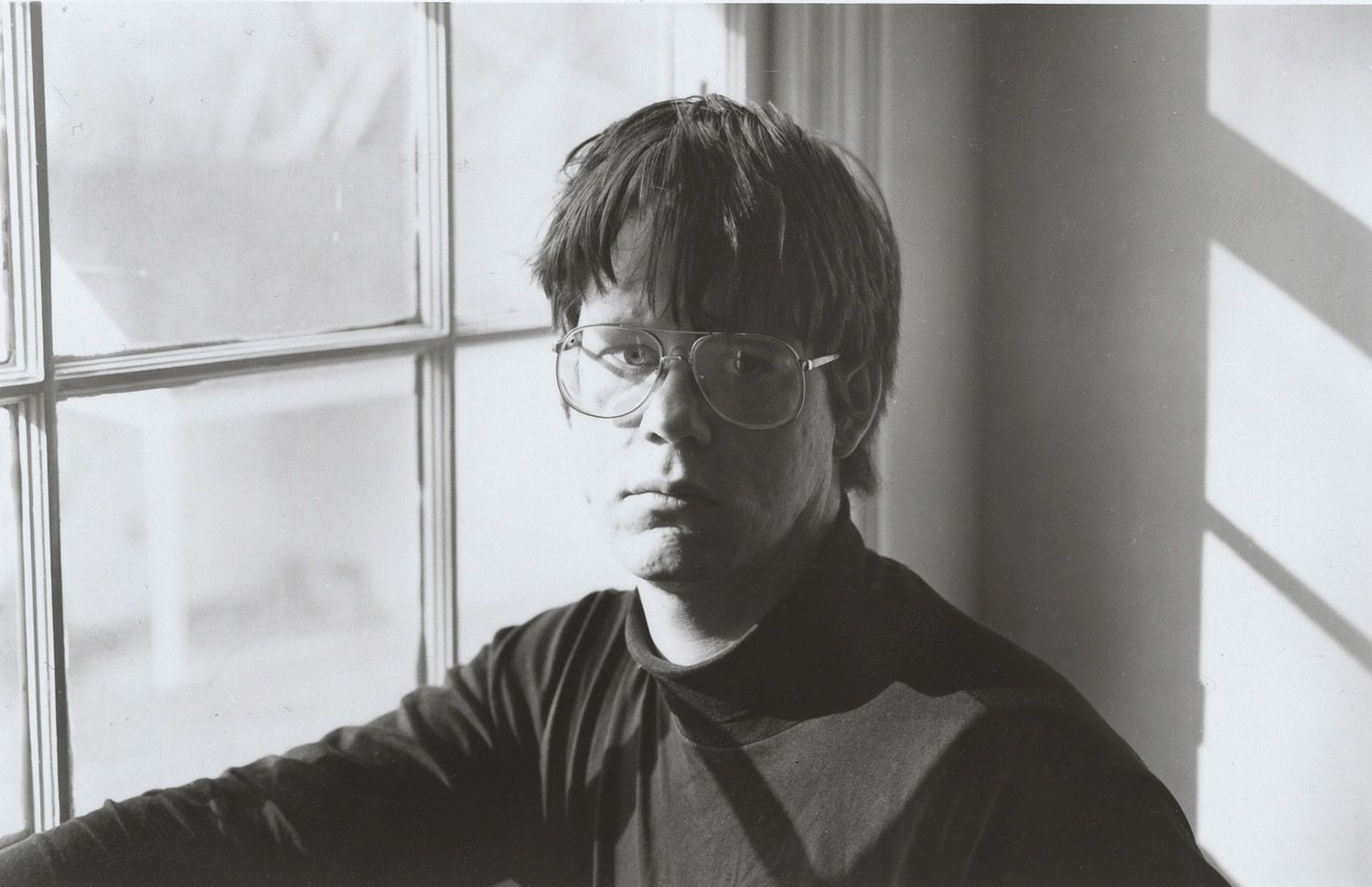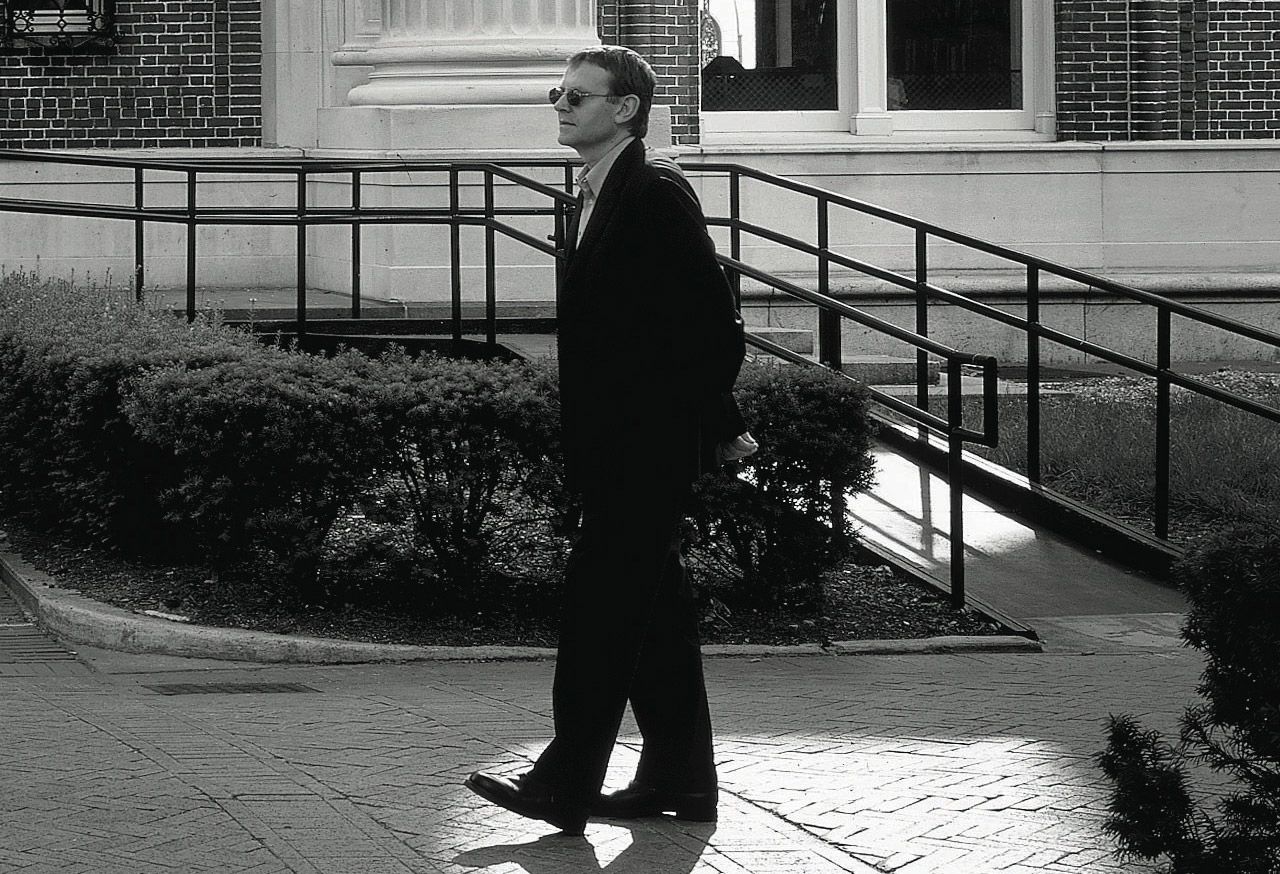BIGGIE SMALLS — THEODOR ADORNO
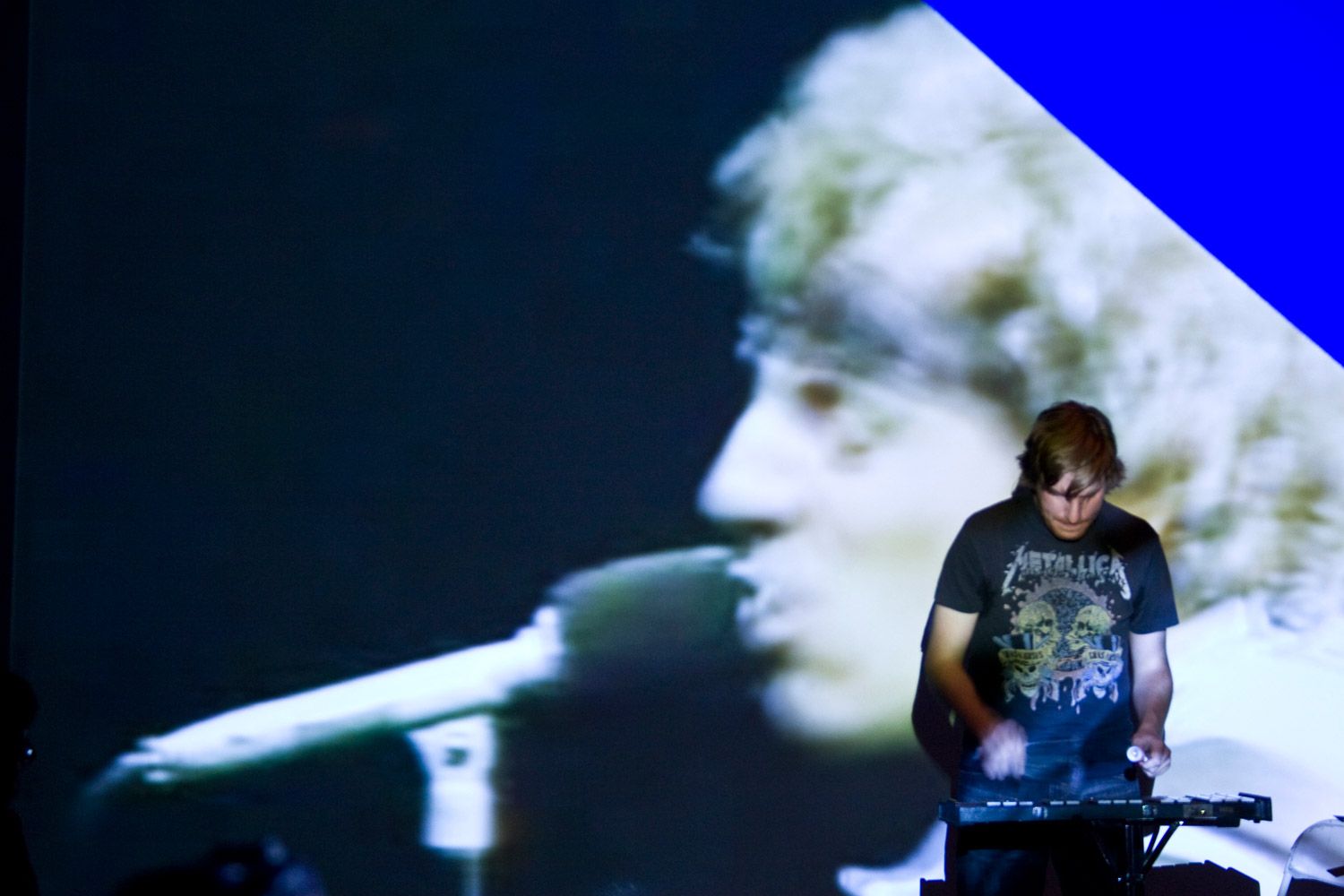
CORY ARCANGEL and PAUL CHAN, both young, both American, and both artists that limn the tangled beauty of a time fraught with revolutions and evolutions in a post-Internet world.
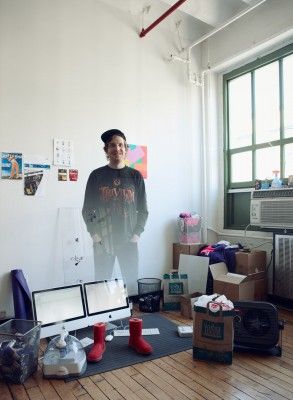
Growing up in Buffalo, NY, Arcangel played lacrosse. He also spent an inordinate amount of time playing video games, and in 2011, it seemed to pay off. At 33, Arcangel became the youngest artist since Bruce Nauman in 1973 to be granted an entire floor of the Whitney Museum. Visitors examined oversized prismatic prints of Photoshop gradients; supermarket display cases that swivel, dancing at their joints; and a wall label that let us know that Arcangel has amped up both cellphone reception and the museum’s WiFi for the duration of the exhibition. Chan, a boyish looking bespectacled 40 year-old, born in Hong Kong and raised in Omaha, NE, has been alloying literature, politics and sex with an art practice that has been drifting towards activism. Chan, a participant of this year’s dOCUMENTA (13), is known for the poetry he wrought from projections of silhouettes, sometimes adrift, sometimes casting a frozen tableau. In 2007, Chan organized for the Classical Theater of Harlem to perform Samuel Beckett’s Waiting for Godot at a storm-ravaged house in Gentilly, a part of New Orleans particularly devastated by Katrina. At the time, spray-painted text captioned the region’s surfaces. “Bodies in attic,” “broken fence,” “dead dog under porch.” As the sun receded into the bayou, as the stage lights came on and people started to emerge from their FEMA trailers, and as the performance began, never had Beckett’s story of existence, confusion and absurdity felt so lived.
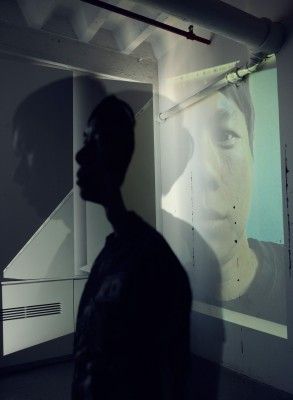
For 032c, they left their studios, which occupy the same building in Brooklyn’s Sunset Park, to talk about hip-hop, PDFs and drinking their own piss.
***
PAUL CHAN: We’re here at Melody Lanes in Sunset Park. Our studios are right down the road in the same building.
CORY ARCANGEL: We had our holiday party here.
PC: It was competitive –
CA: – cutthroat.
PC: Arcangel Studio vs. Badlands Unlimited. We were bowling. Nothing brings people together more than fierce competition, right? People like that, don’t they? I’m surprised we haven’t created more –
CA: – more competitive opportunities.
PC: A guy who once worked for me for a day was a full-time online poker player. He lives on a boat. A couple months ago the Feds shut down online poker in the U.S., so he’s planning on sailing to another country to keep playing – like Aruba. Before he sails away I should get him to teach us to play, so we can run our own poker table at the studio. He told me that when the Feds first shut down online poker, he became a day trader. It was the next logical step. Apparently all of the other day traders were also ex-online poker players.
EMILY SEGAL: I know of a man who’s made millions betting on sports. He’s also really into betting people to do insane things, like shave your head for $10,000 or drink your piss for $5,000.
CA: I would shave my head for $10,000. It would just come back in a week.
PC: I wouldn’t! There’s no thrill in it, there’s no actual risk –
CA: – no risk at all.
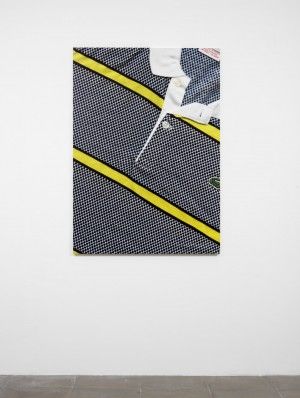
PC: That’s why I would think twice: there’s no real pleasure without risk. But drinking my own urine for $5,000 actually piques my interest. This reminds me of what poet Frederick Seidel once wrote: ‘You need a danger to be safe in.’
CA: That’s going to be the block quote of this interview, Paul Chan – “Drinking my own urine for $5,000 actually piques my interest.”
PC: Gandhi drank his own urine toward the end of his life. He was trying to be as compact and as self-sufficient and independent as possible. He would meditate and proselytize and drink his own urine as a physical manifestation of the ideas about renewal and self-sufficiency he was preaching.
CA: It’s heating up in here. There’s somebody who is dressed and looks exactly like Rick Ross in the next lane.
PC: I’m really of two minds about Ricky Rozay. He constantly talks about how street he is, yet he’s a former parole officer. He was on the wrong side of the law as far as hip hop’s concerned, but he’s been steady.
CA: I always remember people not liking him. Then he’d do guest vocals, and he managed to grind his way to the top, with all odds against him.
PC: He broke the hater barricade.
CA: I thought that was amazing, because you never heard a single good thing about him. Except people would occasionally say, “You know, he’s a pretty good rapper.” I think the Rick Ross ascension is really interesting. Can a rapper with no street cred who raps about street cred make it? All of these articles came out recently trying to figure out the situation: What is hip-hop, and if Rick Ross is at the top, what does that mean? The consensus was that with Rock Ross, hip hip is admitting the scales are tipped in favor of fiction. It’s entertainment, and if you got the skills, you are welcome.
PC: It means the life of hip hop is not so lively. He’s a middling rapper. Maybe rap’s kind of over. Maybe the creativity has moved on to other things. I listened to Tyler the Creator, and it was really kind of depressing. It’s rap about shattered families and broken minds.
CA: I think the Odd Future stuff really has a lot to do with other stuff. It’s interesting in the same manner as many other things lately: it’s dispersed. They do this, they do that. Tumblrs, pop-up shops, books. I don’t think the basket is entirely in rap.
PC: I guess the definition of being open is when you have no taste whatsoever. You’ll try anything because you don’t have any preconceived notions. You have no taste – you’re completely tasteless.
ES: Do you think your personal taste makes you less open?
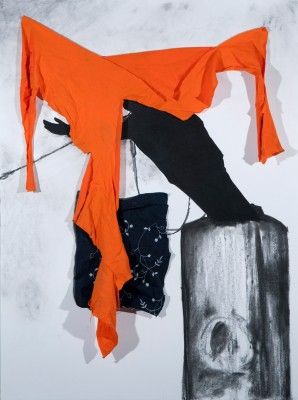
PC: Duchamp talks about that, about taste being merely habit. There’s a whole history of art that talks about it. Beckett talks about it too. It’s important to get away from your own taste. To me, that’s what aesthetic ruthlessness is, a way to clear the ground for something else to spring up, so to speak.
ES: What about Drake?
CA: I don’t mind Drake. I like that he brought low self-esteem into rap. He’s unsure about himself and his success. Apparently this Weeknd guy is even worse: “I’m in a hot tub, partying, but I don’t feel good about it …”
PC: “… are there germs in the water?”
CA: “… am I paying for all this Cristal?”
PC: Maybe the death of hip hop is nigh. Cory knows a lot more about music than I do. I’ll listen to a new Ke$ha song, whatever’s in the air and can pass the time.
CA: I also spend a lot of time with Top 40. I liked “Super Bass” a lot. It’s a full throttle Top 40 pop song.
PC: What have you been listening to?
CA: I’ve been on loop with this record called “Channel Pressure” by Ford & Lopatin. It sounds like a Robert Palmer record in a blender. You know how people make certain kinds of music now that use a sound palette from a certain era, but the end product never could’ve existed in that era? The way it’s arranged, its melodies: it never could’ve existed until, like, five months ago. Ariel Pink is like that. What have you been listening to?
PC: I just saw the New Museum Triennial, and Hassan Khan has this great piece called Jewel and it plays this kind of music called Shaabi music, it’s Arabic belly dancing music but it has a heavy bass line to it. The piece is basically a dark room with a video projection of two guys dancing to Shaabi. It’s funny to watch these two Arab guys dance while everyone else watching the projection stands still. The dancing they did was sort of like Big Pun dancing. Remember Big Pun, from the Terror Squad? Pound for pound the heaviest hip hop crew on earth? Fat Joe and Big Pun: they’d dance just by twisting their torsos. So one of the guys is basically doing a Fat Joe dance. And the other thin guy just does this weird voguing, with arms flying back and forth and hands moving as if he was grabbing imaginary boobs, one at a time.
CA: This bowling alley is on fire right now.
PC: You know who’s nuthin’ but fire still? Weezy.
CA: Did you hear that he has a notebook of all his ideas and at a certain time he had to rid himself of baggage and decided to record all of his ideas in a row and get it over with? This might be a rumor or urban legend, but he recorded thousands of verses, and then he could start again.
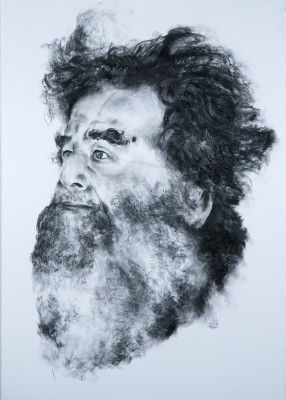
PC: That’s the digital way – it’s choiceless. You can do it all, you might as well just do it all.
CA: Before jail, he’d record on the bus, in the hotel room, and he’d just put it all out there on the Internet.
PC: He’d say, “I want a rock album.”
CA: Oh man, that album is great! “Rebirth.” Some of it sounds like Blink 182. I think it came out the day he went to jail, so it obviously flopped because of the timing. When he had his first hit, “Lollipop,” it was successful because of the inertia all the free stuff had provided. He’d put together a very slick song, and everyone bought that album because he was already famous. That is truly contemporary. You can have that or the opposite: an Internet presence that’s almost nothing. A young band now would take the opposite option. It’s one or the other now. I’ve always favored the first approach, the computer programmer phrase for this is, RERO, or “release early, release often.”
PC: Or you play the free and the hidden against each other. I think we both agree on this. I think the idea of value has changed. Just because something is given away doesn’t mean it doesn’t have value or can’t accrue value. The truth of how we live today is that there’s been a weird transformation of the very idea of value, that we might even have the word “freemium,” and that bands make themselves known by giving stuff away. This wasn’t even in the air a decade ago.
CA: If you gave something away 10 years ago, people would think something was wrong with it.
PC: How we understand ourselves as contemporary, may be the idea that you’re willing to give stuff away, without any semblance of getting anything back at all, or even people understanding what it is you do. And you can tell who’s old school by who complains about their stuff being given away, like artists who complain about being on Ubuweb. I understand their desire to control what they make, but it’s just not the world we live in anymore, and the exposure doesn’t diminish its value or its import in our lives.
CA: There’s a new language of authenticity. People understand what’s real and what’s not. When they see something on Tumblr, or a rip of something, there is an authorized source somewhere. But, from the authorized source to the most degraded bootleg, people understand these gradients of context. And bizarrely enough, I think it all tends to amplify the truly authentic.
PC: It’s an outer and inner awareness of the sociality of things. We can call it context but it’s really about how we’re all much more aware than we used to be about how things interrelate. And the venues and the milieus in which they exist, and how that plays a part in the way work is experienced. I called it once the “burden of connectedness.” It’s the feeling of being bound to the relations that make you possible. I didn’t have a cell phone until two years ago. I’d much prefer to be by myself. But we can’t go back. The question is how can we find a semblance of freedom, without being a complete tool, a complete asshole, or being completely distracted.
ES: Do you worry about being an asshole?
PC: No, but I do worry about not having enough time to figure out whether or not I want to be one.
CA: New forms of social interaction constantly bombard you, and I’ve had to learn just how to not worry about it.
ES: Which social media do you like?
CA: Now that I have Spotify, which I love, I threw out all my MP3s, and I decided if I really love something, I’m going to buy the vinyl. Get about 10 records a year. That’s my plan. I could never stand MP3s. The digital file maintenance – the amount of time it took to make sure they were tagged correctly, that they weren’t in the wrong folder, that the hard drive hasn’t crashed and made them all corrupt – for 10 years I always thought the idea of an MP3 was dishonest about the amount of time it actually took to maintain them properly. But a record is honest. It says: “Look, I’m gonna need some space.” Whereas the MP3 says, “look at all these great things I can do!” But only after you’ve visited the Genius Bar and gotten your data off the crashed drive for the 15th time.
PC: I think that if Kafka were alive today, he’d write a short story about how someone returns home one day to find all of his MP3s mysteriously renamed as random numbers, and the grief and terror he feels having to organize his music collection one file at a time.
CA: I feel like half the stuff I do all day is archivist stuff.
PC: Digital janitor.
CA: The infrastructure it takes to maintain a digital file over its lifetime – power plants, monthly bills, credit cards, operating systems, Foxconn – is so great, sometimes I think these things don’t really exist.
ES: Well, your records could warp. Every type of media requires some form of archival work.
PC: That’s true, if you care. And maybe the point is that we’ve got so much stuff that we’re beginning not to care.
CA: I’m not there yet. I’ve had a computer since I was a kid and I have all that stuff. I have hundreds of thousands of files and I don’t know what to do with it all. And then it just bugs me that it doesn’t even really exist. If the power goes out, I’ll lose everything I’ve ever made.
PC: Have you ever seen Hoarders? It’s like Rick Ross – how do you keep keepin’ on? I don’t want to be buried in emails – I need to rap my middling rap.
CA: I am a total hoarder! Though at the same time, I’ve been working on some stuff for the Internet because the Internet is as exciting as it’s ever been. Works on the Internet are like performances, that I can let go.
PC: It’s true. The net now is not really information – it’s performance. Or information is in fact performance, on the net. That’s a real insight. It feels true. In a way we gain knowledge from the Internet, but it doesn’t give us the kind of understanding or knowledge that we can count on to last. What’s online is performance in every way – from Wikipedia to the Times. Philosophically, it’s performance. I think of my font works that way.
CA: It’s time-based, temporary, and to be experienced at a certain point. You used to think: this is a page! And you thought about it like a page that’s gonna be there, it might be updated, but you remember that idea of a page.
“I love making PDFs. Don’t get me started on making PDFs.”
PC: It’s true. A page!
CA: And now you have these websites that when you get to the bottom, they just have more content.
PC: Fucking Tumblr.
CA: You’re always engaging in these temporary situations.
ES: Now only PDFs have pages.
CA: I love making PDFs. Don’t get me started on making PDFs.
PC: Cory, if you ever write your autobiography, I hope you’d consider the title, Don’t Get Me Started About PDFs.
CA: The thing about a PDF is that it’s basically a file format that’s saying, “Hey, hey, guys, I know you’re excited about digital information, but let me break some news to you. I’m not sure when, but this, right here, is going to come out of a desktop printer.” That’s also what the iPad is.
ES: Clay Shirky, the media theorist, says that Wikipedia is an activity that leaves an encyclopedia in its wake.
CA: I would agree, in its grandest and most beautiful form, that’s what Wikipedia is. There’s so much untapped potential in terms of entertainment – is that what Clay Shirky’s about? All of these TED talks, they just get rolling around your brain and they all mash together.
PC: I hate TED.
CA: But you would do one, if they asked you. C’mon, Paul.
PC: Are you serious?
CA: I would do one in a second. I’d get my 20 minutes.
PC: Technology, Entertainment, Design? It’s basically a string of three random best insight of the night – first is that the Internet is performance, and second is that TED is just three random words put together.
CA: If TED called me, I’d do it in a second! You know I love that kind of thing. TED is mass culture. And I have no qualms trying to participate in that arena. The best way to do a TED talk would be to not prepare anything. To just roll up, straight cold, and just fumble through 20 minutes.
PC: That would be just about perfect. And all you have are tech problems.
CA: Just announce to the audience: I haven’t prepared anything. I’m seeing the reflection of Jeremy Lin in the window of the bar, here. I have a little bit of Linsanity.
PC: I love basketball. It’s the only sport I really watch.
CA: Even Kobe said this guy’s for real, how come nobody knew? We need to figure out what’s wrong with the system.
PC: It wasn’t until an hour into our holiday party at this bowling alley that I realized that Cory’s made work about bowling.
CA: My work that has bowling in it isn’t really about bowling. Bowling is a metaphor for whatever it means to be alive. We see other things in this stuff. It affirms other parts of ourselves. In Jeremy Lin, one person might see a way to affirm his hope that the world can’t be predicted by data crunching.
PC: Life in its most interesting form: a surprise.
CA: I saw someone with confidence: Can you even imagine having that kind of confidence? In the end sports are unambiguous. Somebody wins and somebody loses.
PC: Duchamp talks about that in terms of chess. He says it’s completely Cartesian. It doesn’t have the ambiguity and confusion you have in art. That’s why he loved it. There’s a winner and a loser. The moves are logical, but the logic only reveals itself at the end. You’re playing against an opponent, and he’s thinking of his moves, and its not until you’re fucking up or losing that you realize what their logic is – but there is a logic. He’s planning your demise, but you just can’t see how he’s planning it, because you’re busy planning his demise. And that clarity is what gave him the most pleasure.
In making work, it makes me more sensitive to the multiplicity of things. For example, in Cory’s show at the Whitney – the piece had to do with bowling only insofar as it didn’t. Art is a reminder that what is, isn’t. In other words, whatever art is saying, it is always also saying, “this is not it.” And there’s real freedom in that, and pleasure.
Text EMILY SEGAL, Portraits CLANG
